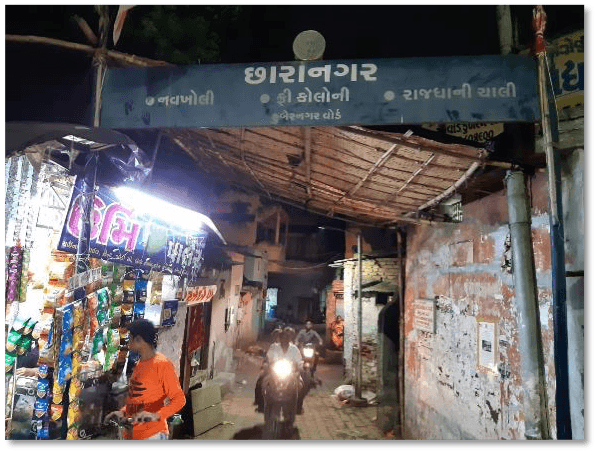
As we get closer to India’s 73rd Independence Day on 15th August this year, I realized that we have not yet achieved ‘Sampoorna Swaraj’ or complete and absolute independence. Independence for each and every citizen of the country is still a novel concept for many. Freedom to – live, laugh, speak, work and entertain is not yet a gift for all of us. The problem gets worse – some of our countrymen are not recognized as rightful citizens of our country. People call them ‘criminal’ tribesmen or ‘denotified tribes’ today – perhaps casting the shadow of British colonialism till date. Chhara is one of 190+ such unique communities in India, living primarily in Gujarat and some parts of Rajasthan. While countless number of articles today will talk about their plight, this article intends to shed some light on their successes, and what makes them unique in their very own way. It also talks about the now world-famous Budhan Theater, born out of Chharanagar.
This 15000+ people settlement in Chharanagar of Ahmedabad, Gujarat is one of the most closely-knit communities. Known to have served the British royalty back then by theatrical and dance performances, they were taught to brew country liquor out of fruits, jaggery and different vegetables. As years went by, they perfected the art, and today every household in Chharanagar knows how to make liquor of different flavors. Having been a nomadic tribe for long before settling down, most of this liquor was for personal consumption by adults in the family. Even today, they speak proudly of the subtlety and talent in their alcohol-brewing process. Inspite of Gujarat being a dry state, the Chhara liquor is famous and consumed by people in Ahmedabad in various quantities.
The community prides itself in having a high gender ratio, a high female literacy rate, and increasing acceptance in terms of love and inter-caste marriages. People are progressive towards adopting new vocations to earn their livelihood. Even though Chharanagar has a lot of widows, the women in the settlements are actively trying to uproot alcohol addiction towards their spouses and other male family members. Beset as they are with lack of civic amenities, atrocities by authorities and discrimination by the society at large, Chharanagar showed signs that the community has not given up.
Perhaps the most powerful weapon in their arsenal is their expression of art. Adding a softer dimension to their struggle, artistic expression by Chharas has been heard and seen by the world over. Driven partly by the exorbitantly demanding streams like science and commerce, Chhara students have actively taken up arts and humanities disciplines and plowed back to their cause. ‘Science makes products, art makes humans’, says Atish Indrekar, a Chhara community activist with graduation in Dramatic Arts and diploma in Mass Communication. The Budhan Theater, setup by Ganesh N. Devy as a theater for community development, has made strides in the direction of advocating their cause – “Born Actors, not Born Criminals”. The theater is located at the heart of Chharanagar in their ‘library’, a sight worth admiring in a place which lacks basic civic facilities. The theater derives its name from the first play on the police atrocities on Bhudan Sabar, an innocent ‘criminal’ tribal in West Bengal.
Today, they have 30+ plays some with over 300+ shows, and 3-4 award-winning, critically-acclaimed movies. Dakxin Bajrange, Budhan Theater’s creative head and a Ford Foundation fellow has directed a film called ‘Birth 1971’ – a movie showing the conditions of stigmatized, then criminal and today’s denotified tribes. Apart from garnering awards and recognitions, what makes the theater unique is its boldness in expression of social injustice issues. They believe in presenting hard facts and harsh realities while still being able to maintain a connect with the audience. The entire group, including actors, directors and playwrights are members of the Chhara community and produce shows in vernacular and common national languages.
Notably, they enjoy consistent support of NGOs like Bhasha, TISS etc. to spread awareness and drive their movement. Bhasha’s recent engagement with the Chhara community in curating an exhibition in Satya Art gallery at Ahmedabad was the only project in India to be selected to Communities Connecting Heritage project by Washington-based World Learning and sponsored by the U.S. Department of State. IIM Ahmedabad also has an elective course in collaboration with Budhan Theater to engage B-school students in participatory theater to develop social analysis and empathy skills.
At the core of all their problems sits a lack of leadership at the top, to lead from the front and uplift them from the lowest echelons of the society. 190+ tribes need to come together to move the legislation in their favor. States like Haryana and Gujarat have recognized Denotified and Nomadic Tribes (DNTs) and witnessed some success, but only a strong national unison can break the shackles of this social stigma from the core. Till then – a strong sense of communal unity, a resistance from youth and the strength of their expression of arts in the form of Budhan Theater will create awareness and develop empathy. Perhaps the legislation take its due course of time, but such deeply-rooted social stigma can only be dealt with a feeling of harmony and social acceptance and rejection of the second-class notion of Chharas.
As we celebrate the 73rd Independence Day next month with a feeling of pride in our hearts and heads held high, let’s also participate in what Chharas and other DNTs call their own Independence Day or Vimukt Divas on 31st August – the day in 1952 when the horrific Criminal Tribes Act of 1871 was repealed by the then Indian Parliament. It is also hoped that with destigmatization of such communities, we could be able to achieve the Sampoorna Swaraj our forefathers and freedom fighters wished and died for.











































